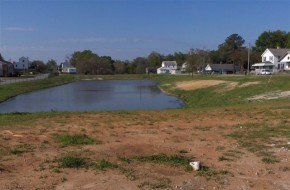
City of Union, Rock Hill, City of Florence, Florence County, Aiken County, Edisto Beach, Spartanburg County, Ware Shoals, City of Greenwood, and the Greenville County Redevelopment Authority- what do all these South Carolina communities have in common?
All have benefitted by borrowing from DHEC’s low interest Brownfield Revolving Fund to cleanup a brownfields site in their community
Brownfields are generally unsightly, contaminated commercial and industrial properties. Many are prominent eyesores that tarnish our communities. One prime example many can relate to are the various abandoned and dilapidated textile mills found throughout South Carolina, some right in the center of town.
A local example in the Catawba Region is the former brownfield that was adjacent to the Union County Courthouse and Union City Hall. With the help of DHEC’s Revolving Loan Fund as well as CDBG funding, the property ,which was a dilapidated textile mill, is completely cleaned up and is being marketed for a multi-use project.
How can the DHEC Brownfields Revolving Loan fund help?
Funded by grants from EPA, this $6 million fund is available to local governments, non-profits and even businesses to help finance the cleanup of documented contaminated sites throughout the state.
Catawba Regional COG serves as the statewide manager of the Revolving Loan Fund on behalf of DHEC.
Currently, the fund is offering loans at a 1 percent interest rate over a ten year period. For local governments and non-profits, the Revolving Loan Fund program will forgive or, in essence, convert into a grant up to 25 percent of the amount borrowed with a cap of $100,000. So on a $400,000RLF loan, the payback would be reduced to $300,000 plus 1 percent interest.
In a financial environment where grants are often difficult to come by, using the DHEC Brownfield Loan program can fill a needed financing void in helping improve the appearance, environmental safety and real estate marketability of key sites within your community.
For more information on how the program can benefit your community, contact the Catawba Regional COG at 803-327-9041.

 (803) 327-9041
(803) 327-9041
